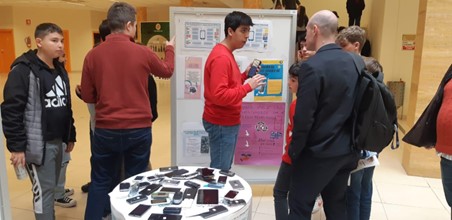PEDRO POVEDA SCHOOL (JAÉN): “The solution is in your pocket”
The Pedro Poveda School is a concerted Center with public funding with various educational levels: Early Childhood Education, Primary Education and Secondary Education. It is located in the southern area of the city of Jaén and carries out essential work there.

The SCP has been carried out by 43 students in the fourth year of Secondary Education (15 years old) together with 5 teachers and different members of the community, mainly relatives and acquaintances of the students, “Clean Point” Agency, town Hall and neighborhood Association. The students, organized by groups, have addressed the general question: how can we manage technological waste? Based on this challenge, each group of students, guided by their teachers, have decided to organize a collection of disabled mobile phones among their relatives and acquaintances. The collected mobiles were classified to be repaired and sold or to be properly recycled. Although the teachers raised the initial challenge, the students specified the actions to be carried out. First, they thought about what to do, enhancing the capacities of each member of the team. Some of them have designed posters to request help from other students at the Center, others students decided to collaborate in classifying the material, other groups committed search for people to donate their mobile phones, and thus, collaboratively, all of them contributed to meet the proposed challenge.
Thus, the students carried out multiple actions, among which we highlight the following:
- Analysis of the origin of the problem, from environmental, economic, ethical and social points of view.
- Fine-tuning of the procedure to catalogue and organize the collected materials.
- Organization of a small business for the optimization of electronic devices: collection, recycling of elements, shipment for repair, sale, etc.
- The profits obtained will be dedicated to the energetic improvement of the Center.
- Dissemination campaign.


The solutions identified for the problem of technological waste management were the following:
- Social awareness about the manufacturing process and about the use of electronic devices.
- Selective collection of electronic waste obtaining economic benefit.
- Positive impact on the energy efficiency of the school.
- Reduction of CO2 emissions: 1) management of the waste generated by electronic devices, 2) reduction of energy consumption in the Center.
This SCP will be continued in successive courses, in such a way that in the next academic year students will be guided to continue with the mobile repair and recycling campaign and the phase of improvement of the Center’s energy efficiency will begin. It is expected that in this phase they will install light timers and electricity consumption meters, request and install photovoltaic panels, if possible, thus seeking for neutrality in terms of CO2.
Students have disseminated the SCP through social networks and informing relatives and acquaintances
Regarding the obstacles, the beginning was uncertain, the students themselves thought of the project as a way of doing something different from their normal classes, but as the project progressed, and they saw that they had a leading role, they took the problem seriously and have become cognitively hooked on it. From their interventions, they explain to be interested in this type of project and specifically those related to caring for the environment. The students emphasize the importance of repairing and recycling mobile devices due to the scarcity of materials and the pollution generated by poor waste management.
